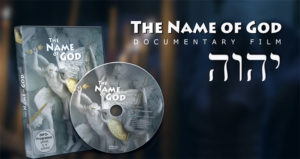
In part 3 we continue to look at the Name of God documentary being shown by Jehovah’s Witnesses. Its 60 minutes long and made to high production standards. The film sets out its stall by observing that the thousands of gods in this world all have names, but in the Judaeo-Christian world God’s name is not used or known:
‘Since this prohibition has been persistent for about 2,000 years, and been broadly adopted by the churches of Christendom, a disturbing state has now been reached in which God’s name has almost been forgotten, and its pronunciation seems uncertain. This movie considers whether the concealment of God’s name is actually in harmony with Scripture and, furthermore, whether the correct pronunciation of the name can be found again.’
Two issues are addressed: 1) the concealment of God’s name, and 2) the pronunciation of God’s name. I have already addressed a third; 3) the question of this film’s ‘independence.’ It is worth noting that many of the narrative arguments presented here you will meet on the doorstep.
Read part one here
Read part two here
We are now halfway through the film and from this point onwards we encounter familiar enough Jehovah’s Witness arguments for inserting God’s name into the New Testament. Despite strident claims to independence, this film faithfully parrots Watchtower teaching, never honestly representing alternative viewpoints, consistently taking a swipe at ‘the churches of Christendom.’
A time is placed down the left side of the page to mark at which point in the film I have stopped to comment.
27:03:
Who is Lord?
Here Rolf Furuli insists there is confusion following the removal of the Name from the New Testament:
‘Modern translations use the name ‘Lord’ both for God and for Jesus. In the New Testament there are about 100 places where there is total confusion, we cannot know whether the reference is Jesus or God. And, of course, the writers of the New Testament did not cause this confusion, but those who removed the name of God from the Scriptures.’
When it is baldly stated like this we might be forgiven for thinking he has a point, but when we look at our Bibles we find a different story. Psalm 110:1 is given as an example of this confusion: ‘The LORD says to my Lord: Sit at my right hand until I make your enemies a footstool for your feet.’
There is no confusion, because in our Bibles the first LORD is in capitals, the second Lord in lower case where the Septuagint used LORD in smaller capitals. This is one of the most cited psalms in the New Testament (Mt.22:44; Mk.12:36; Lk.20:42,43; Acts 2:34,35). It is almost entirely future oriented, refers to a Davidic king, and the first Christians clearly understood it to be Messianic (Acts 2:34,35). Jesus himself exegetes this text in Mark 12:35-37, where he identifies the second Lord as ‘the Christ’ or Messiah. Rolf Furuli fails to point this out though he must surely know it. We know it because we take the whole counsel of God from the whole word of God, and not from the latest Watchtower.

For Rolf Furuli then to aver, ‘…the writers of the New Testament did not cause this confusion, but those who removed the name of God from the Scriptures,’ is misleading. It suggests the name was in the original New Testament manuscripts. We will be looking at their ‘evidence’ for this claim next time, but this is a classic example of stating what has yet to be proven. There is not one New Testament manuscript extant in which the Tetragram appears. Indeed, as Doug Harris points out in Awake to the Watchtower:
‘It is a wild assumption to say that the manuscript Jesus read in the synagogue contained the tetragram…Would the Scribes and the Pharisees allow him to pronounce the name without a violent outburst! LK.4:22 tells us they all began to give favourable witness. I do not believe that this calm, appreciative reaction followed the first time the tetragram had been pronounced in a synagogue for hundreds of years!’
Doug goes on to point out:
‘The Old Testament revelation included the tetragram but the New Testament does not; so what revelation do we receive of God in the New Testament? Over a hundred times in the Gospels alone we read ‘Father’. This is the New Testament revelation. The remote ‘Jehovah’ of the Old Testament has become the close intimate Father of the New.’
29.03
Baal of Confusion
The argument is put that substituting LORD, or God, for Jehovah causes further problems because these are appellatives, common nouns which might refer to any god, not proper names that would identify a particular God. ‘God and Lord can refer to many different persons, including Satan, and including idols for that matter,‘ says Furuli. 2 Cor.4:3 is given as an example of this use of the common noun, god.
The commentary goes on to say, ‘And also, the seemingly neutral title Lord has a disconcerting connotation, since Lord is rendered Baal in the Akkadian language of Babylon. The name Baal is a Semitic word meaning Lord or Master,’ we are told. ‘To the Babylonians it is Bel, to the Canaanites or Jews Baal. In order to prevent a mix between the Jewish and Pagan religion,’ Gerard Gertoux informs us, ‘the commandment to not use the name Baal for God is listed in the Bible.’
The root for God and LORD to the Jews is El, as in Bethel, House of God, not Baal. Baal enters the vocabulary of God’s people for a very different reason. There is no specific commandment to not call Jehovah by the name Baal. If there were you can be sure they would have quoted it. Hosea does write, ‘In that day, declares the LORD, you will call me ‘my Husband,’ and no longer call me ‘my Baal.” (Hosea 2:16,17) The ancient Hebrew for ‘my Husband’ sounded like ‘my Baal,’ (Ex.21:22; 2 Sam.11:26) and confusion did arise, but look at the Hosea text:
‘In that day, declares the LORD (Yaweh), you will call me ‘my Husband,’ (Ishi) and no longer call me ‘my Baal.’
This is not God saying ‘call me Jehovah not Baal’ but God saying, ‘Don’t get confused about who your husband is because of a linguistic muddle over an old generic term.’
I am sure when I say God, or Lord, I know who I mean and so do you, so does Jehovah, and so do Jehovah’s Witnesses.
32:03:
The Name Above Every [Other] Name
‘Even the churches of Christendom,’ the commentary claims, ‘try to make God’s name fade into oblivion, Solely Jesus is accepted as a deity.’ No evidence is presented to validate this shocking and mischievous claim. ‘Paul’s letter to the Philippians gives an insight into the true relationship between Jesus and the Father,’ it goes on. Here Rolf Furuli quotes a verse from Paul’s letter. It sounds so authoritative because he first reads out the Greek, yet I believe he is not speaking now as an authority, but as a Jehovah’s Witness. You see, the Greek text does not say what his English translation says:
‘For this very reason God exalted him to a superior position and kindly gave him the name that is above every other name.’ (Philip.2:9)
This is exactly how it reads in the 2013 New World Translation. If we go to an earlier NWT we read:
‘For this very reason also God exalted him to a superior position and kindly gave him the name that is above every [other] name.’ (Philip.2:9, NWT 1984 ed.)
You will notice the earlier version puts the word ‘other’ in [square brackets.] These usually denote a word has been inserted into the text that isn’t there in the original. That level of integrity has vanished from the 2013 New World Translation as ‘other’ now forms part of the main text with no qualification.
There can be good reasons for adding words to the text, such as to make the Greek sentence structure more accessible in English. It shouldn’t change the meaning of the text however, but clarify what the text already tells us, and it should always be made clear that it is a gloss on the text. [Other] is not in the Greek text, neither does it clarify but changes entirely the meaning.
In every recognised translation, it reads, ‘gave him the name above every name.’ (NIV, ESV, KJV, NASB). Jehovah’s Witnesses are Unitarians, deny the deity of Jesus, so insist he cannot have the name above every name, because that is God’s Name. They therefore correct, not the grammar, but the theology of this text.
Call on the Name of…
Rolf Furuli states, ‘Jesus is never called Jehovah, but his name points to Jehovah and says, Jehovah is the only one that causes salvation.’
We then go to Joel, ‘…and everyone who calls on the name of Jehovah will be saved.’ (Joel 2:32 NWT) thence to Romans, ‘For everyone who calls on the name of Jehovah will be saved.’ (Ro.10:13 NWT) We are meant to infer that, just as Jesus pointed to Jehovah for salvation, so Joel and Paul. A pattern of prophetic men is being established. But if we look closely at the wider text we see a problem:
”The word is near you; it is in your mouth and in your heart’ that is, the word of faith we are proclaiming: That if you confess with your mouth, ‘Jesus is Lord (Gk. Kurious) and believe in your heart that God raised him from the dead, you will be saved…for ‘Everyone who calls on the name of the Lord (Gk. Kurios) will be saved.” (Ro.10:8-13 NIV)
How are we saved? ‘Everyone who calls on the name of the Lord (Gk. Kurios) will be saved.” ( NIV, ESV, KJV)
Who is ‘Lord?’ ‘…if you confess with your mouth, ‘Jesus is Lord (Gk. Kurious)…”
Again, Jehovah’s Witnesses have changed the text in v.13 to make the second Kurios mean Jehovah even when the first Kurios is clearly identified as Jesus. This is because they cannot accept that the name in which we trust for salvation is the name of Jesus, and cannot accept the clear implication that this same quote from Joel must be referring to Jesus, who is Lord (Gk. Kurios) and God (Gk. Theos Jn.20:28)
There are enormous problems here for Jehovah’s Witnesses. In this text the NWT gives us two separate Lords, even as the NWT of John 1:1 gives us two gods. Here the film-maker faces an enormous challenge since even the Father calls Jesus God:
‘When he (the Father) brings the firstborn into the world, he says, “Let all God’s angels worship (proskuneō) him.” Of the angels he says, “He makes his angels winds, and his ministers a flame of fire.” But of the Son he says, “Your throne, O God, is forever and ever, the sceptre of uprightness is the sceptre of your kingdom.”‘ (Heb.1:6-8)
The NWT gives a very different rendering. Angels are said to ‘do obeisance’ to Jesus. This is a ‘nice’ distinction and easily cleared up when we look at Strong’s explanation: (proskuneō, meaning to kiss, like a dog licking his master’s hand); to fawn or crouch to, that is, (literally or figuratively) prostrate oneself in homage (do reverence to, adore): – worship.) What was that last word again?
It is in verse 8 we find the greatest mischief. Their translation reads, ‘God is your throne…’ If you are determined to rob Jesus of Deity this is the only possible translation, and the Greek construction can allow for this, but it is very tortuous, unsupported by the rest of Scripture, and questionable for two reasons:
1. God’s angels already worship Jesus
2. Hebrews 1:8 is a direct quote from Psalm 45:6, which reads, ‘Your throne, O God, will last forever and ever; a sceptre of justice will be the sceptre of you kingdom.’ Whose throne in the New Testament? Jesus’ throne. Whose throne in the Old Testament? God’s throne. Of course, the NWT reads back into the Old Testament their translation of Heb.1:8.
The Catholic Connection
‘Salvation obviously seems to be linked to calling upon God’s name,’ continues the commentary. ‘That is what the Bible says. But where do churches stand? In a ‘Vatican directive on the use of the name of God in the sacred liturgy’ from 2008, addressed to the conference of bishops around the world, it is stated that the Tetragrammaton should be replaced with Lord, and that God’s name in its diverse forms, including Jahweh and Jehovah – should neither be used, nor uttered in the liturgy, prayers, or church hymns.’
Gerard Gertoux points out a contradiction here, ‘since the official Catholic Bible, the Jerusalem Bible, uses the form Yahweh, and some popes…use the name too.’
Roman Church caught read-handed? No. This is either ignorance or disingenuousness. I would settle for the former if Rolf Furuli had not assured me in an email that Poppenberg had researched widely, including consulting Catholic scholars. Why, then, did he not find the directive and try to understand it?
Fr. Felix Just SJ is a member of the Loyola Institute of Spirituality and was asked about this directive. You can read here the question and his answer. You can read the directive here. Three things become apparent:
1) It applies specifically to Liturgical settings and not to private Bible reading, prayer, or worship.
2) It does not carry the same weight of authority as teachings of the popes or ecumenical councils.
3) Its purpose is to fall back into line with a long tradition in the church for substituting ‘Lord.’
Whatever you think of the Catholic Church, no one is ‘up to something’ here, there is nothing to see but a shameless and misleading piece of anti-Catholic propaganda.
Note: If you wish to buy a copy of this film go to Drei Linden Films directly and translate the page to follow instructions for ordering. Drei Linden allowed me to pay on receipt and is much cheaper.

